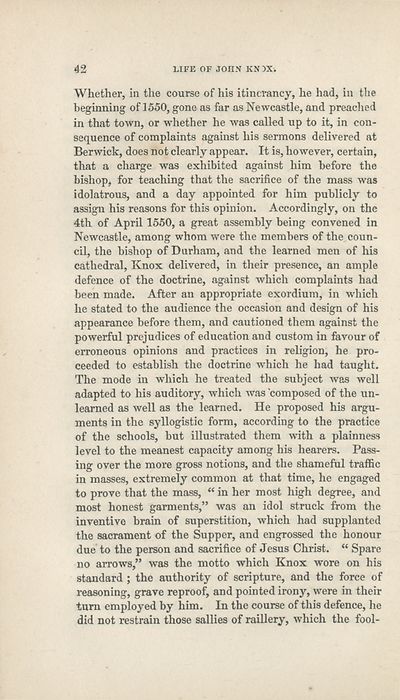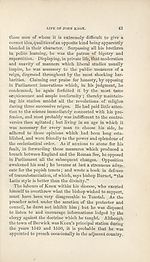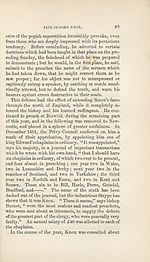Download files
Complete book:
Individual page:
Thumbnail gallery: Grid view | List view

42
LIFE OF JOH-V KN:
Whether, in the course of his itinerancy, he had, in the
beginning of 1550, gone as far as Newcastle, and preached
in that town, or whether he was called up to it, in con¬
sequence of complaints against his sermons delivered at
Berwick, does not clearly appear. It is, however, certain,
that a charge was exhibited against him before the
bishop, for teaching that the sacrifice of the mass was
idolatrous, and a day appointed for him publicly to
assign his reasons for this opinion. Accordingly, on the
4th of April 1550, a great assembly being convened in
Newcastle, among whom were the members of the coun¬
cil, the bishop of Durham, and the learned men of his
cathedral, Knox delivered, in their presence, an ample
defence of the doctrine, against which complaints had
been made. After an appropriate exordium, in which
he stated to the audience the occasion and design of his
appearance before them, and cautioned them against the
powerful prejudices of education and custom in favour of
erroneous opinions and practices in religion, he pro¬
ceeded to establish the doctrine which he had taught.
The mode in which he treated the subject was well
adapted to his auditory, which was composed of the un¬
learned as well as the learned. He proposed his argu¬
ments in the syllogistic form, according to the practice
of the schools, but illustrated them with a plainness
level to the meanest capacity among his hearers. Pass¬
ing over the more gross notions, and the shameful traffic
in masses, extremely common at that time, he engaged
to prove that the mass, “ in her most high degree, and
most honest garments,” was an idol struck from the
inventive brain of superstition, which had supplanted
the sacrament of the Supper, and engrossed the honour
due to the person and sacrifice of Jesus Christ. “ Spare
no arrows,” was the motto which Knox wore on his
standard ; the authority of scripture, and the force of
reasoning, grave reproof, and pointed irony, were in their
turn employed by him. In the course of this defence, he
did not restrain those sallies of raillery, which the fool-
LIFE OF JOH-V KN:
Whether, in the course of his itinerancy, he had, in the
beginning of 1550, gone as far as Newcastle, and preached
in that town, or whether he was called up to it, in con¬
sequence of complaints against his sermons delivered at
Berwick, does not clearly appear. It is, however, certain,
that a charge was exhibited against him before the
bishop, for teaching that the sacrifice of the mass was
idolatrous, and a day appointed for him publicly to
assign his reasons for this opinion. Accordingly, on the
4th of April 1550, a great assembly being convened in
Newcastle, among whom were the members of the coun¬
cil, the bishop of Durham, and the learned men of his
cathedral, Knox delivered, in their presence, an ample
defence of the doctrine, against which complaints had
been made. After an appropriate exordium, in which
he stated to the audience the occasion and design of his
appearance before them, and cautioned them against the
powerful prejudices of education and custom in favour of
erroneous opinions and practices in religion, he pro¬
ceeded to establish the doctrine which he had taught.
The mode in which he treated the subject was well
adapted to his auditory, which was composed of the un¬
learned as well as the learned. He proposed his argu¬
ments in the syllogistic form, according to the practice
of the schools, but illustrated them with a plainness
level to the meanest capacity among his hearers. Pass¬
ing over the more gross notions, and the shameful traffic
in masses, extremely common at that time, he engaged
to prove that the mass, “ in her most high degree, and
most honest garments,” was an idol struck from the
inventive brain of superstition, which had supplanted
the sacrament of the Supper, and engrossed the honour
due to the person and sacrifice of Jesus Christ. “ Spare
no arrows,” was the motto which Knox wore on his
standard ; the authority of scripture, and the force of
reasoning, grave reproof, and pointed irony, were in their
turn employed by him. In the course of this defence, he
did not restrain those sallies of raillery, which the fool-
Set display mode to:
![]() Universal Viewer |
Universal Viewer | ![]() Mirador |
Large image | Transcription
Mirador |
Large image | Transcription
| Antiquarian books of Scotland > Scotland/Scots > Life of John Knox ; and, The life of Alexander Henderson > (60) |
|---|
| Permanent URL | https://digital.nls.uk/131833024 |
|---|
| Description | Thousands of printed books from the Antiquarian Books of Scotland collection which dates from 1641 to the 1980s. The collection consists of 14,800 books which were published in Scotland or have a Scottish connection, e.g. through the author, printer or owner. Subjects covered include sport, education, diseases, adventure, occupations, Jacobites, politics and religion. Among the 29 languages represented are English, Gaelic, Italian, French, Russian and Swedish. |
|---|

